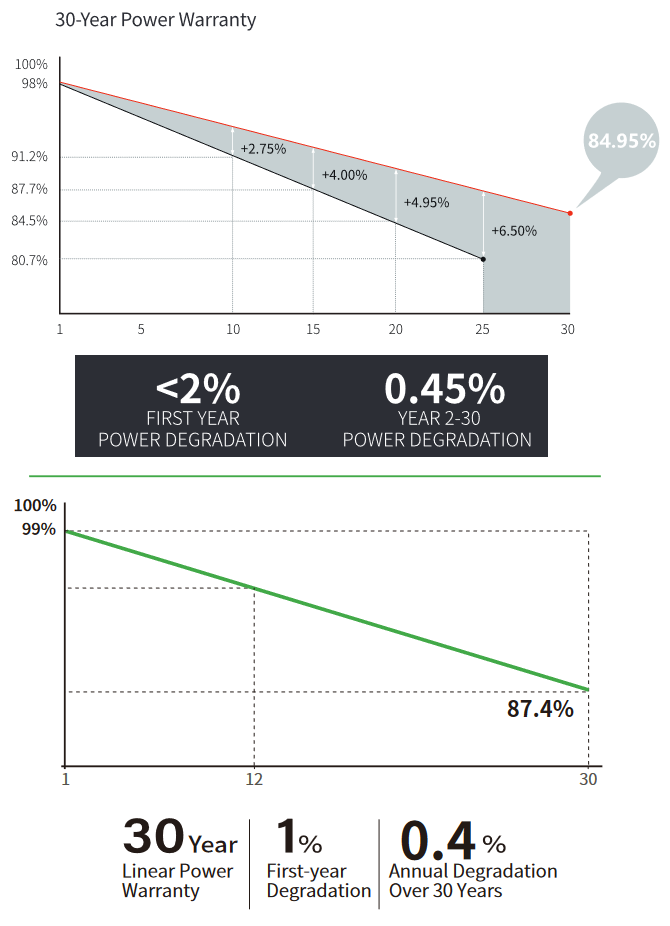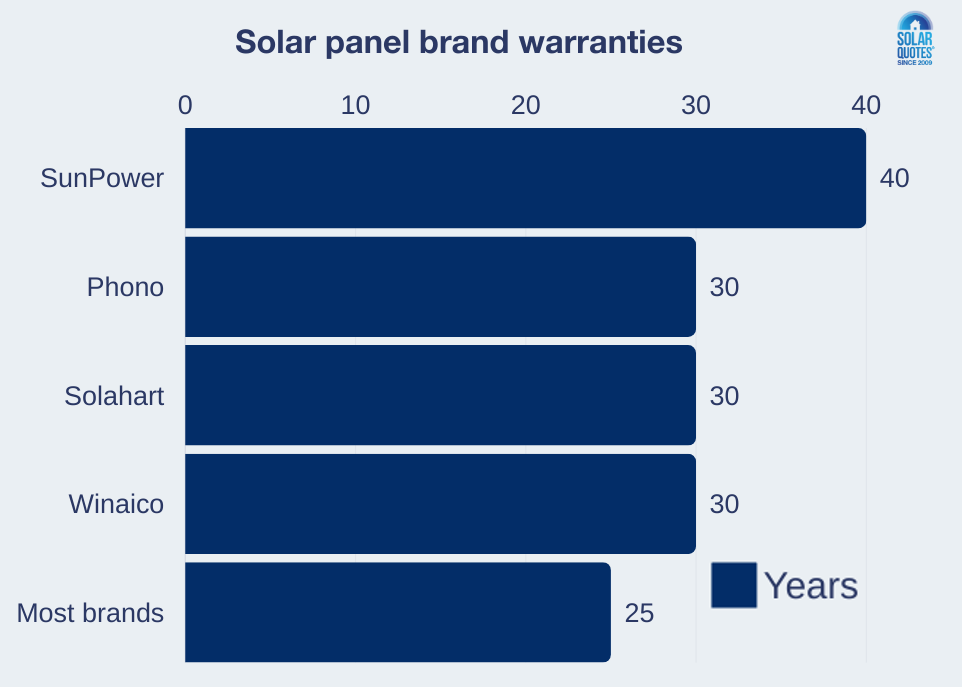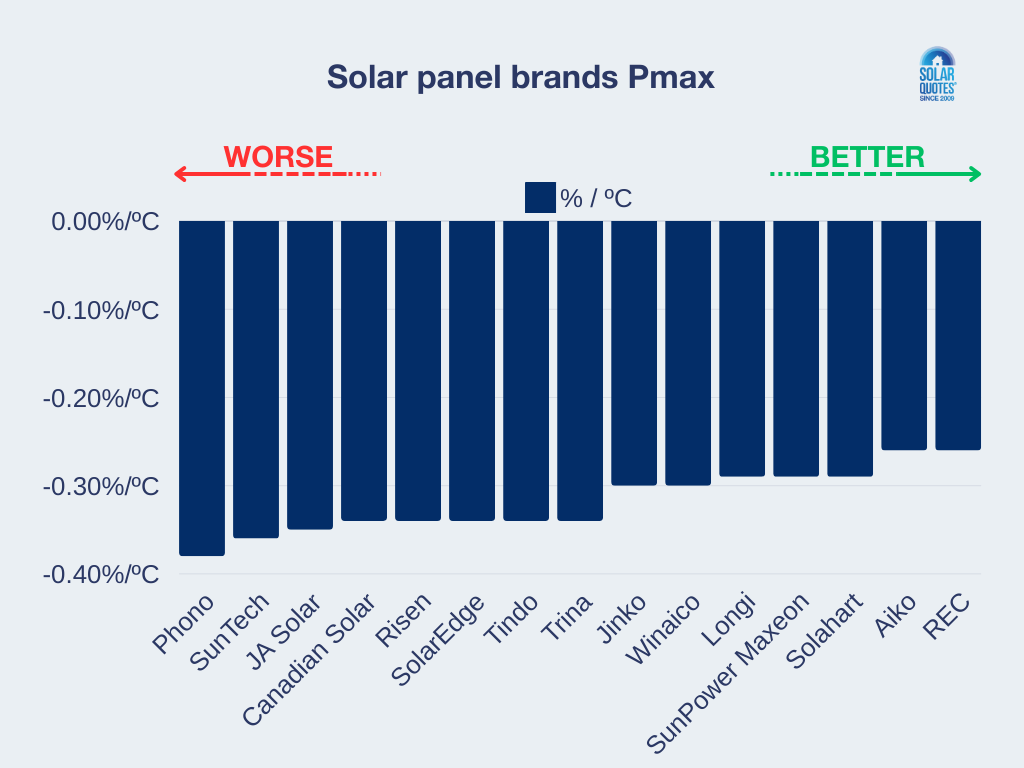Solar Panels Made Simple: A Guide to Comparing and Buying
Last Updated: 31st Dec 2024 By Finn Peacock, Chartered Electrical Engineer, Fact Checked By Ronald Brakels
How do you compare over 4,300 models of solar panels from nearly 100 manufacturers approved in Australia? I’m glad you asked! Here at SolarQuotes we’ve put together a handy, up-to-date comparison tool that lets you compare pricing and technical specifications of products currently available in Australia (updated regularly).
If you look at a solar panel specification sheet (aka datasheet), it can often look like a physics textbook, full of numbers and strange symbols. For those of us without a degree in rocket-science, how do we make an informed solar panel comparison?
Table of Contents
- Comparing Solar Panels: 5 Things That Really Matter
- What Else to Consider Before Buying Solar Panels
- Tips for Comparing Quotes and Installers
Comparing Solar Panels: 5 Things That Really Matter
Well, I reckon there are 6 things you need to look at when choosing solar panels for your home to maximise the chances you are getting good quality products.
1) ‘Tier 1’ Solar Panels – What Are They?
‘Tier 1’ refers to a ranking given to solar panel manufacturers by Bloomberg New Energy Finance. They publish a quarterly list and charge thousands of dollars to access it. Tier 1 is not a direct measure of quality or performance. It measures how ‘bankable’ the solar panel manufacturer is. In other words – how likely are they to stay in business? Solar farm builders use it to reduce the risk of panel manufacturers going bust. If you are building a large-scale solar power station, your investors won’t go near you unless you use solar panels from a Tier 1 company. Getting a panel from a Tier 1 manufacturer is pretty low risk because the big manufacturers used in solar farms are almost all on top of quality control.
Just be aware of less-than-honest salespeople who will insist their panels from WaWaSuperHappySolar are Tier 1!
Tier 1 manufacturers include: Trina, Canadian Solar, Longi, JA Solar, and REC to name a few.
Non-Tier-1 manufacturers are the smaller players that produce panels. You can get some good panels from them, but unless you know the solar manufacturing landscape, it is a lot riskier – because 80% of the lower tier panels are junk. Also, the smaller companies are less likely to be around in the future. For those reasons, I always recommend the non-solar expert to stick to Tier 1 panels – unless the manufacturer has a good record for reliability and customer service in Australia. For example, Australian-made Tindo Solar panels are not Tier 1, but I’m more than happy to have them on my roof because I know they’re well-made.
You can read more about the tier ranking system for solar panels here.
2) Warranty Types: Performance vs. Product
Be aware that all solar panels come with two warranties – a performance warranty and the product warranty (also known as the manufacturer’s warranty).
Performance Warranties
Most performance warranties are for 25 or 30 years and promise a panel’s performance won’t deteriorate by more than a given amount. Some performance warranties are better than others, as the following graphs show:
The first allows up to 2% capacity loss in the first year and then up to 0.45% of its original capacity each year after that. This means, after 30 years, it will have at least 84.95% of its original capacity. (The grey area on the graph is meant to show how much better it is than an older 25 year warranty.)
The second allows just 1% loss in the first year and then 0.4% loss each year after that. This gives a minimum of 87.4% of original capacity after 30 years.
The second performance warranty is clearly better. If both panels degraded by the maximum permitted amount, the second panel would, all else equal, produce around 1.5% more energy over its first 20 years. However, because panels normally deteriorate by less than the maximum allowed, the actual difference is only likely to be around 1%.
Product Warranties
The second type of warranty panels have is the product or manufacturer’s warranty. This covers panels against faults in materials and construction. They’re easy to compare because longer is better. They are also normally considered much more important than the performance warranty because, in practice, it’s very difficult to accurately measure panel deterioration.
Don’t buy a panel with a manufacturer’s warranty of less than 10 years. These days most good-quality panels have at least 12 or 15 year product warranties. It’s also now easy to get low-cost but well-made panels with 25 year product warranties. Some manufacturers now offer 30 years and, if you don’t mind paying a premium, the longest product warranty around is 40 years from SunPower.
3) Understanding Power Tolerance
Power tolerance refers to how close a solar panel will be to the specified wattage in real-world conditions. For example, if it is a 440-watt panel and the power tolerance is +/-3%, your actual wattage could be from 427 watts up to 453 watts.
These days many quality panels have a “positive-only” power tolerance, with +0-3% being common. That means a 440W module will never be less than 440 watts and could be up to 453 watts. A positive-only power tolerance is better than a plus or minus because always getting at least what you paid for is better than a 50% chance of getting less. But it normally makes little difference to the total output over a panel’s life. In practice, the extra amount from positive tolerance usually averages to under 1%. Because of the small difference it makes, power tolerance is probably best used as a tiebreaker when choosing between very similar panels.
4) Panel Efficiency: Does it Matter?
When comparing panels, efficiency is not as important as most people think. As long as the module efficiency is over 20%, it should be fine. More efficient panels don’t produce more electricity, they just take up less room on your roof. Unless roof space is critical, don’t stress about efficiency.
If roof space is critical, a 23% efficient panel can produce 15% more energy per square metre than a 20% efficient panel. As this difference is worth chasing, higher efficiency panels are definitely worthwhile, given it’s no longer necessary to pay premium prices for them.
5) Temperature Coefficient: Impact of Heat
Solar panels love sunlight, but they hate heat. Their power drops as they get hotter. The temperature coefficient measures how much their power output reduces for every degree rise in temperature above 25°C – and that’s panel temperature, not ambient temperature. The temperature coefficient generally ranges from under -0.3% per °C (good) to -0.4% per °C (not as good). In the latter case, if the panel temperature goes up 20°C, the power will drop 0.4 x 20 = 8%.
While this loss of power isn’t good, it’s not a major problem because panels only get really hot when there’s plenty of direct sunshine and so plenty of solar generation. A low-temperature coefficent is still useful, but only to a modest extent.
By keeping the above 5 points in mind, you can compare solar panels with a good degree of confidence and sift out the spin. So now that you have settled on the panels you want, what are some other things you need to consider before your purchase?
What Else to Consider Before Buying Solar Panels
If you’re thinking of buying solar panels for your Australian home, there are 4 areas you need to understand before you make a purchase decision:
1. Government Solar Rebates and Subsidies
It is important you understand what government solar rebates and subsidies are available to you as in many circumstances, these can pay a significant proportion of the up-front cost of solar panels.
2. Feed-In Tariffs and Payback Periods
You need to know how much you will get paid for the surplus solar electricity you export to the grid, as this can make a difference to how long it will take for the system to pay for itself. This will depend on how much your electricity retailer pays you as a feed-in tariff. The good news is most Australians can pick and choose their electricity retailer to find the best combination of feed-in tariff and usage rates. You can compare electricity plans and feed-in tariffs in your postcode here.
3. Choosing a Reliable Installers
When you are ready to buy, you should always get multiple quotes from installers. You should be comfortable analysing these quotes and deciding which one will best suit your unique circumstances. Our solar 101 guide will get you up to speed in 17 minutes.
4. Financing Your Solar Panels
How will you be financing the solar panels for your home? 100% up front? Put it on the mortgage? Get a personal loan? To make that call, you need to understand the economics of solar. Calculate the savings and estimate your post-solar electricity bills with our very comprehensive, accurate and easy-to-use solar and battery calculator.
It’s also worth highlighting 2 golden rules in any type of purchasing: “caveat emptor” (buyer beware) and “you get what you pay for“. We are fortunate in Australia to have an accreditation program, strong standards and *generally* a pretty well-regulated industry, despite what you may have read in mainstream media and heard from some politicians from time to time.
However, something of a gold rush in our industry due to generous rebates and falling solar PV prices resulted in a very small number of unscrupulous companies emerging. In some cases, they have serviced customers poorly, provided poor quality products and sometimes installed solar power systems that are unsafe.
Tips For Comparing Quotes And Installers
Use your intuition when choosing a supplier and ask yourself these questions before signing any contract of sale.
-
- Does the deal sound too good to be true? (if it does, it probably is)
- Does the solar company understand what they are talking about and are they technically competent? (These questions will have the uninformed salesperson running for the hills!)
- Does the firm have a reasonable track record of successful customer service? (These solar installer reviews will reveal all!)
- What are the terms and conditions of their offer?
- Are there any negative stories about the business on forums or blogs? (search their name in this forum to find the serial offenders!)
- Are they transparent about all the details of who makes the solar panels and inverters? You can see where solar panel and inverter brands lie on the scale of budget to premium with the brand charts in our solar 101 guide.
- What guarantees are they providing about installation date, grid connection, service and power output – and what compensation will they agree to if they don’t deliver?
- Have they checked that the voltage at your switchboard is not too high to enable reliable inverter operation?
Solar panels are a wonderful product and a solar power system can be a great investment for your home. Don’t squander the opportunity by getting caught with a shonky company or simply poor service for the sake of a few dollars.
We hope you’ve found this quick solar buyer’s guide useful – check out the rest of the site for more detailed information!


